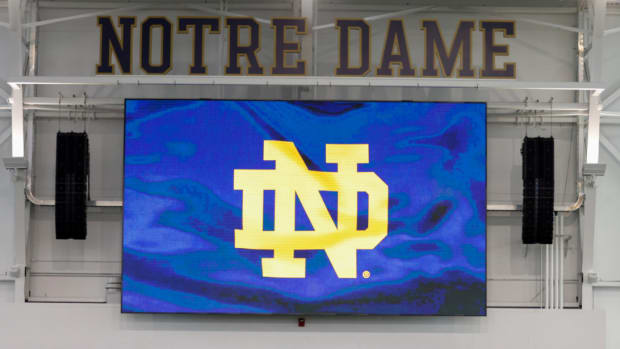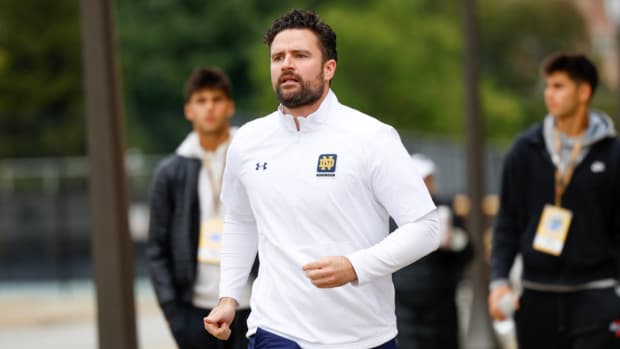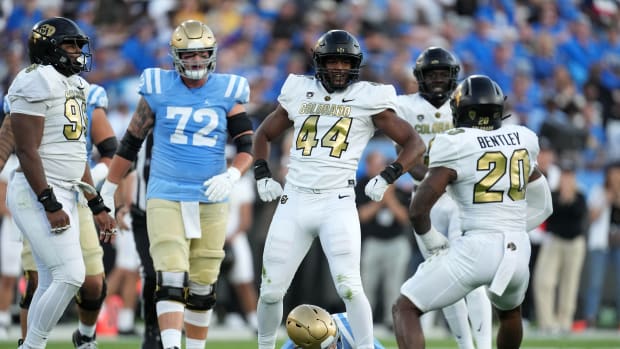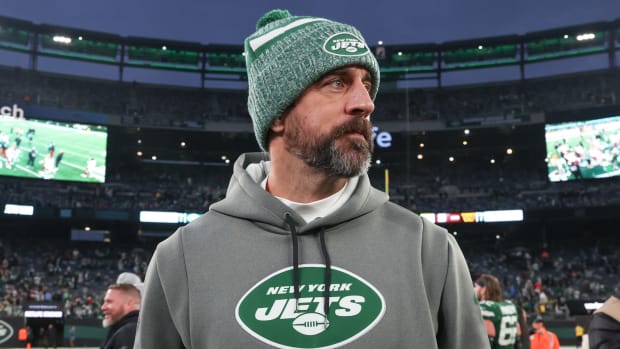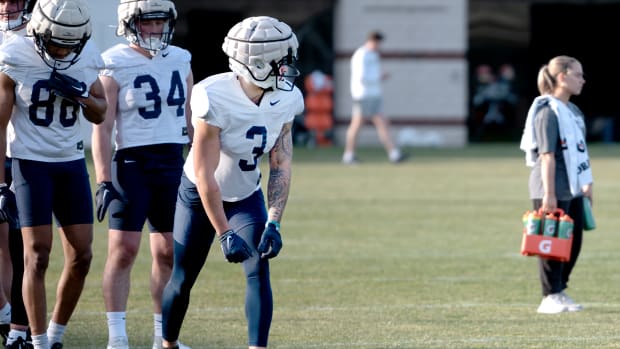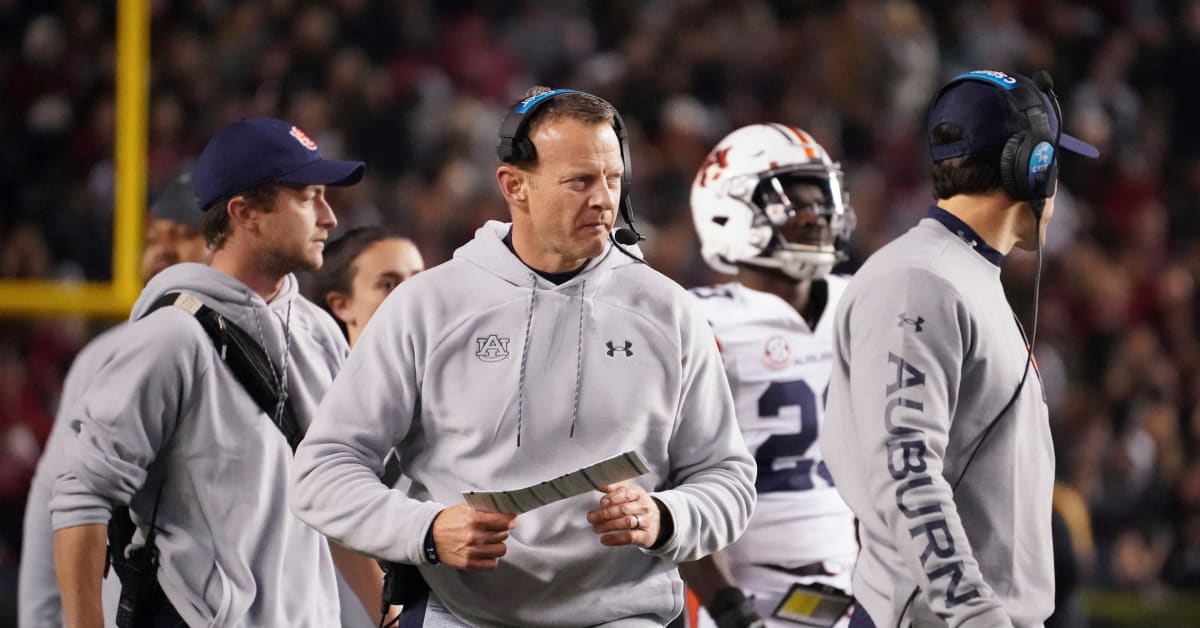
Coach Bryan Harsin Is Staying at Auburn, But Now Faces Impossible Task
This time, it appears Auburn has out-Auburned Auburn. Bryan Harsin will remain as the Tigers’ coach—a result that seemed unconscionable just a few days ago.
If what happened here was simply the dollar amount was too much for rich boosters to pay (sources told Sports Illustrated earlier this week that Harsin had no appetite to take a dime less than the almost $18 million buyout in his contract), perhaps they didn’t want to feel like Harsin bested them in negotiations.
So they’ll put up with this product, a product and coach they didn’t initially want, only to do this all over again at the end of the calendar year at a modest discount? That’s an odd way to express your love for Auburn.
Now this husk of a marriage will carry on into the 2022 season, and Auburn will move forward with everyone understanding the program has stripped more power away from its coach. Harsin will have to rebound from controversies that led school president Jay Gogue to begin an internal investigation of the coach and his staff.
After the 2020 regular season, influential Auburn boosters, who fall in the category of “the powers that be,” ran Gus Malzahn out, partially because they believed the coach lost the recruiting race against Georgia and other SEC powerhouses. They then tried to install assistant coach Kevin Steele, but got spooked by a social media campaign denouncing that choice and ultimately backed down. During that same time, there were also flirtations with Mario Cristobal (then at Oregon) and Billy Napier (then at Louisiana) that didn’t pan out. UAB’s Bill Clark was also in the running, but he was chafed after getting the impression he wouldn’t be able to hire his own staff.
Then the one person whose job it was to ostensibly run the football program stepped into the chaotic void: athletic director Allen Greene. Along with Gogue, Greene handled the search that landed Harsin and briefly wrestled power back from the boosters by putting an outsider in the role. But it was painfully clear early on that Harsin was not cut out for the job.
His two chief rivals, Nick Saban and Kirby Smart, are way better CEOs, so what exactly was his advantage supposed to be over the long term? Ask Florida what it’s like to try to scheme your way to a national title via the SEC without the talent the upper echelon possesses. It’s all enough to make any big-money booster queasy.
Harsin is more of the X’s-and-O’s variety of coach than CEO, which is partially from a temperament that has been described as robotic by one source and a “hard ass” by another. That disposition was reflected by team captain Chandler Wooten.
On the problematic end, former Auburn defensive lineman Lee Hunter said he and his teammates were treated “like dogs.”
Harsin also set himself up to fail in those little ways—exhibiting an inability or unwillingness to gladhand, for example—that began to pile up. A few months after taking the job, he skipped Bo Jackson’s golf tournament, opting to send subordinates. You do not have to know much to know that if you’re the new football coach at Auburn, you should probably go to the golf tournament Jackson is hosting, whether or not you can swing a club worth a damn.
There have been additional fissures within Harsin’s coaching and support staffs: Boise State guys, brought in from his Broncos staff, versus SEC guys. Harsin fired wide receivers coach Cornelius Williams after four games and offensive coordinator Mike Bobo after the regular season. Harsin had a few offensive coordinator targets—Zak Hill, who Auburn shied away from hiring due to compliance concerns (he was later fired by Arizona State as part of the NCAA’s probe) and Austin Davis, who spent roughly a month on the job before resigning for “personal reasons.” Defensive coordinator Derek Mason also left Auburn and the SEC for Oklahoma State, which raised eyebrows.
That kind of turnover, combined with 20 player transfers in the offseason, points to issues that go beyond normal booster hand-wringing and shifts in culture after a coaching change—it was the impetus for Gogue’s in-depth investigation to separate fact from fiction.
Now that the school says it has done that and is keeping its coach, Harsin faces a nearly impossible task.
First, there is the matter of winning games on the field with a schedule that includes Penn State, the usual SEC West gantlet and Georgia from the East. Win total projections aren’t out yet, but before this mess, the Tigers were +10000 to win a national championship (a 0.99% implied probability), so expect that to dwindle. The Tigers were already third in FBS with 20 transfers out and only five in. The exodus will likely continue after spring practice, CFB’s under-the-radar transfer window, as those who hope to play the 2022 season elsewhere must declare by May 1.
There’s also the matter of recruiting, which is always at the forefront of players’ minds as they look to compete in an increasingly difficult league. The first full-cycle recruiting class is typically indicative of how talent acquisition is going to go. Harsin’s staff turned in a 2022 haul that finished eighth in the SEC. His second class can’t afford to be as bad. It’s early, but recruitniks are already projecting the state of Alabama to have something of a golden-generation class this year, with 11 top-100 players in the early 247Sports rankings (the usual number is around five) and six in the top 37. Those are the makings of a recruiting class that can give any coach a talent shot in the arm, but how could you possibly expect Auburn to compete during this crucial in-state cycle now?
Whether Auburn wants to admit it or not, it is punting on the 2022 season and its 2023 recruiting cycle. Harsin will have to answer questions around this saga at SEC media days, to recruits’ parents during the summer, on the donor luncheon circuit and after tough losses during the season. To think this fiasco will go away is ludicrous, especially if Harsin does anything other than win immediately and win big during the regular season.
If Harsin agreed to change some of his approaches with how he runs this team—personally and professionally—why should we expect it will matter for these Tigers with what they’re up against after what has happened over the past few days? This situation seemed untenable even before Harsin returned Wednesday from vacation abroad, and yet it continues. For a bit, it looked like Harsin had found a way to align those in power at Auburn, not for him, but against him. It looked like his days were numbered.
Now the entire Tigers apparatus, from administrators to boosters to players, must be in lockstep with him to even have a chance. That is an even dicier proposition considering Auburn will have a new president in June, and many throughout the industry do not expect Greene to remain in his post for the long term.
Yes, Auburn has decided to keep its football coach, and the problems and challenges that come with him. This means we'll likely be going through the same cycle a few months from now.
More College Football Coverage:
- Lincoln Riley Clarifies Stance on Transfer Portal
- Arch Manning Reportedly Removes Clemson From Short List
- Movement to Make NCAA Athletes Employees Takes Major Step
- Auburn Daily: Former Arkansas State AD Speaks Out on Bryan Harsin
For more Auburn Tigers coverage, head over to Auburn Daily.


